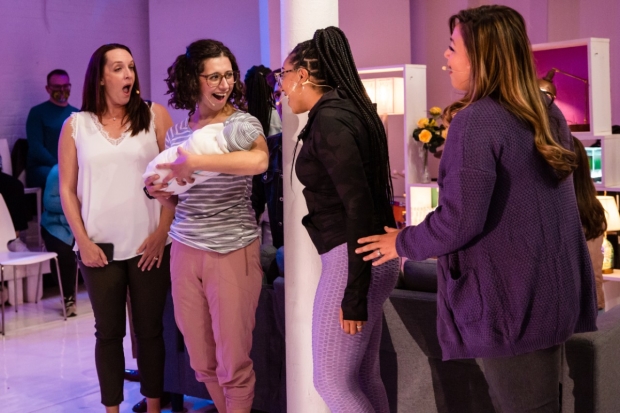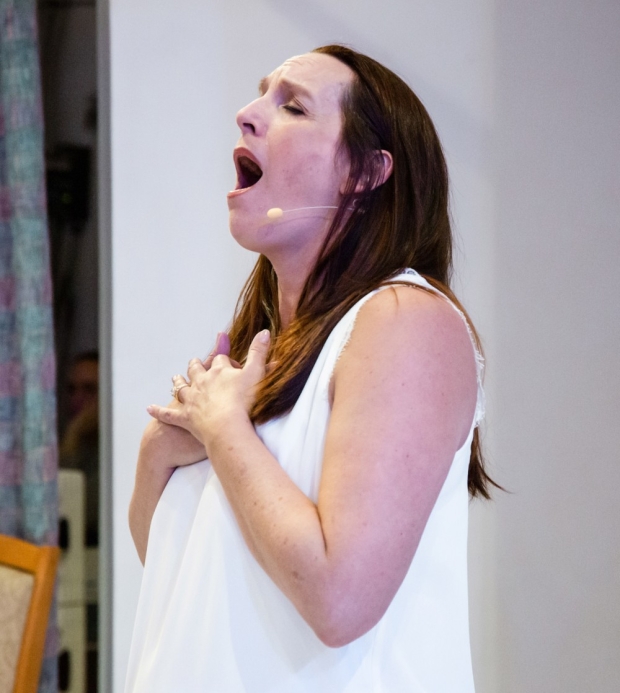Review: Baby Tries to Have It All in the 21st Century

(© Jo Chiang)
Out of the Box Theatrics, true to its name, has given an inventive update to Richard Maltby Jr., David Shire, and Sybille Pearson's 1983 chestnut Baby, a sweet musical about three couples maneuvering the trials of pregnancy. It seems like a timeless enough premise to endure at least a few decades of cultural evolution. And yet, despite its best intentions, not even a well-placed edit or a creative restaging can free Baby from the amber in which it is frozen.
Ethan Paulini, OOTB's associate artistic director, serves as director and choreographer of this immersive production, held in a 60-seat loft at Theatrelab. The intimate proceedings (efficiently designed by Rien Schlecht) put you, quite literally, in the middle of our three couples' collective living rooms — a proximity that turns out to be more exposing than it is gratifying.
Julia Murney, who stars as our ambivalent, late-in-life mother-to-be Arlene, delivers the only performance complex enough to be believed from inches away. She sings the contemplative Act 2 song "Patterns" to great effect, contemplating her stagnant identity as a mother to grown children and wife to her resident co-parent Alan (Robert H. Fowler). "Patterns" is not the musical's most memorable tune (to its credit, Baby is not lacking in lovely melodies), but it is one of the musical's only moments of genuine tension, while everything else may as well be tied with a pastel ribbon and delivered to a baby shower.

(© Jo Chiang)
It is very likely that this trio of stories did not feel quite so neatly packaged when they first hit Broadway in the 1980s. After all, in Arlene you have a middle-aged woman who is not jumping for joy at the thought of a newborn; in Pam (played here by Danielle Summons) you have a basketball coach in her 30s managing fertility issues with her partner (Pam's husband Nick is rewritten as her wife Nicki, played by Jamila Sabares-Klemm); and in Lizzie (Liz Flemming) you have a college junior who is having a child with her musician boyfriend Danny (Johnny Link), but who bucks tradition by rejecting a marriage proposal.
Each story is untidy in its own way, but at the end of the day, each fits snugly into the bounds of heteronormative, family first America. Nearly 40 years later, Paulini attempts to have these couples push a few more boundaries, but with their narratives rather firmly set, most of these changes barely make a dent. Our same-sex couple sweetly repositions the song "Romance" as a parody on the mechanical process of turkey baster fertilization, but Nicki is shoehorned into the number "Fatherhood Blues" as the non-carrying mother in her partnership. Lizzie and Danny, meanwhile, make brief mention of their respective disabilities (Lizzie is legally blind and Danny is partially deaf, as are the actors who play them), and discuss how their child might inherit these genetic traits. Those concerns, however, are swiftly tucked away and we return to our previously scheduled programming about a pair of delusional college students who think the institution of marriage is the only thing that could impede their personal ambitions.
Flemming closes Act 1 with a lovely rendition of "The Story Goes On" — Baby's signature ballad about generational legacy and those gooiest of existential feelings that come with pregnancy. It can be mawkish for the most cynical among us, but there is something about David Shire's melody that gives the number a free pass to embrace its sentimentality. "I Want It All," meanwhile, remains the musical's anthem of female empowerment, though its function is a little hazier these days. Having debuted in the thick of Gen X "have-it-all" feminism, this song was a battle cry for mothers with aspirations beyond driving carpool. Murney, Flemming, and Summons — as a trio of 21st-century women who (should) know by now it's just not that simple — are no longer singing from a place of exhilaration and endless possibility. As they list their female heroes (an updated lyrical roster that now includes Michelle Obama), you can feel the tinge of awareness in the room that this is more an exercise in magical thinking than a determined crusade. The disillusioning fact of the matter is that "having it all," like Baby, looks different than it did 40 years ago.

(© Jo Chiang)











